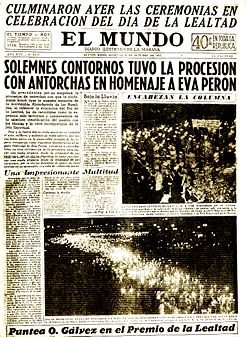El Mundo (Argentina)

Cover page of El Mundo from 19 October 1952
|
|
| Type | Morning daily |
|---|---|
| Founded | 14 May 1928 |
| Language | Spanish |
| Ceased publication | 22 December 1967 |
| Headquarters | Buenos Aires |
| Circulation | up to 500,000 |
El Mundo (The World) was a daily morning paper published in Buenos Aires, Argentina by Editorial Haynes company. It was launched on 14 May 1928 and circulated until mid-1967, when there was an unsuccessful attempt to convert it into an evening paper. Its publication during the Infamous Decade (1930–1943) provided reporting at a time of instability and repression. After Juan Perón's election in 1946, the publishing company was taken over by Peronistas, who forced the paper to take their line.
Editorial Haynes (Haynes Publishing) was founded by Albert Haynes, an Englishman who came to Argentina in 1887 to work for the British-owned Buenos Aires Western Railway. Deciding to settle, he entered into publishing, launching the magazine El Hogar (the Home), which became a great success. His company launched other magazines which were advanced for the period, with bold design and images. On 29 December 1923, Editorial Haynes opened its main building on Río de Janeiro and Bogotá Streets, in Buenos Aires, and installed modern printing machinery.
Haynes' first try to found a daily newspaper, El Mundo, did not succeed. On 24 May 1928 his company re-launched El Mundo in a tabloid format, which was easy for workers to read while commuting by trams, was full of pictures, much cheaper than other papers, and featured a weekly competition for a prize of $1,000 dependent on the football results.
Albert Haynes died of a syncope on 21 June 1929, by which time the newspaper was already establishing a strong readership. He was succeeded by his son-in-law, British-born Henry Wesley Smith. He ran the newspaper until it was expropriated and taken over by the Alea state consortium in 1939. Throughout this period, the paper gave quiet support to British interests in Argentina.
Pablo Mastandrea (11 February 1906 – 29 November 1976), an anarchist, worked in Haynes Publishing for decades as a typesetter, along with Don Emilio Mulli. Both were militant union delegates who stood up for the rights of the workers during the Infamous Decade (1930–1943). This period was characterized by electoral fraud, persecution of the political opposition (mainly against the UCR), and generalised government corruption, against the background of the Great Depression.
...
Wikipedia
